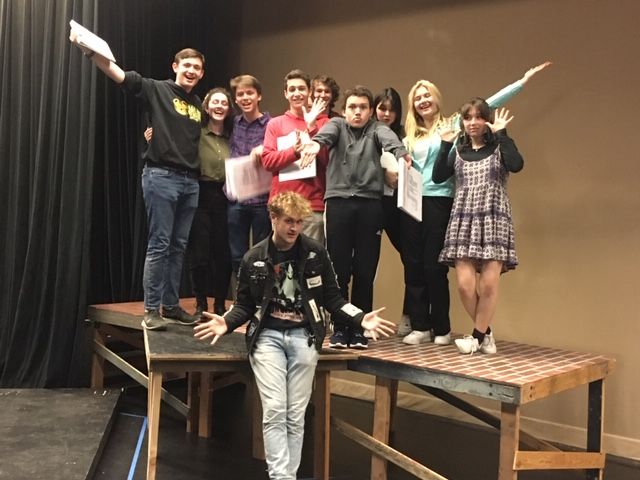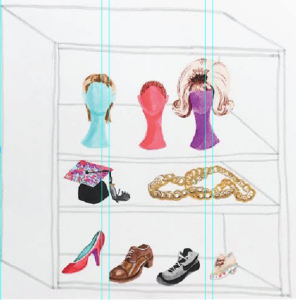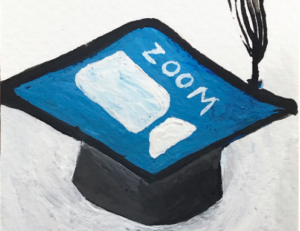On the night of October 6, 1998, Matthew Wayne Shepard, a gay college student, was tied to a fence in the outskirts of Laramie, Wyoming, and severely beaten. Shepard died from the brutal head injuries he received that night six days later at Poudre Valley Hospital in Fort Collins, Colorado.
Shepard’s murder caused ripples all over the US and began a national conversation about hate crimes. It illuminated the need for new hate crime legislation. Shepard’s death was a call to an eleven-year fight which ended with the signing of the Matthew Shepard Act into law by President Obama in 2009.
Shepard’s death also put a spotlight on Laramie, the town where Shepard was attending college at the University of Wyoming. Thousands of reporters descended on Laramie’s streets. The eye of the nation was on this small town.
In the immediate aftermath of the murder, an unexpected group of individuals arrived in Laramie alongside the press: actors.
Moisés Kaufman and a team of actors and writers from the New York-based Tectonic Theatre Project came to Laramie and began a series of what would grow into over two hundred interviews with the citizens of Laramie, all revolving around the death of Matthew Shepard. What came of these interviews was a play entitled The Laramie Project. The Laramie Project (TLP) is a kind of play that uses “Moment Work,” a production based on moments as opposed to scenes, to give audiences a window into the minds of Laramie residents.
The Laramie Project was slated to be the LWHS spring production. However, as LWHS implemented the Distance Learning Plan and escalated measures to address the spread of COVID-19, the decision was made to cancel the production.

Lick-Wilmerding drama teacher Miguel Zavala had been wanting to put on TLP for some time, but never felt the time was right. After participating in a summer workshop with Tectonic Theatre Project and talking with Kaufman himself, as well as the encouragement of his colleagues, Zavala made the decision to bring TLP to Lick. Amidst all of the political tensions and challenges facing the LGBTQ+ community and other minorities now in the US, it “made [him] feel like this is my contribution to being an advocate for change, and this play lends itself to create that kind of learning space for students and for the community,” Zavala said.
The TLP production launched at Lick was because the cast and crew of the play were not the only Lick students involved. Lick students taking Psychology: Brain and Behavior (B&B) were also participating in the production, though not as actors.
The unique relationship between the theatre team and the B&B classes grew out of a previous collaboration between the two departments when LWHS put on Marat/Sade, a play with music that takes place within a historic insane asylum in France where the actors portray inmates of the asylum. This previous collaboration consisted of “students doing research, sharing research with actors who were working on that play and then ultimately creating a website for the whole community,” explains B&B teacher Anton Krukowski. B&B students’ role in TLP was very similar.
Krukowski said that one focus of all the B&B classes this year is compassion and empathy, attributes that aligned with what Zavala was hoping to bring into the community through TLP. Zavala approached Krukowski and Carrie Maslow, the other B&B teacher, about reviving the collaboration.
Staging the play and the collaboration between theater and B&B is, “about education and community,” Zavala said. “There are many functions of theater, one of them is to provoke dialogue, and I think that is a very healthy thing.”
Despite the care with which the production of TLP was being approached, there were still concerns about the effects that the production would have on both the cast and B&B students. Krukowski expressed this, “we were thinking about how to address those concerns up front so that students felt supported in going into the topic,” he said, “and as long as we were upfront about what the effects might be of focusing on a topic like this for a long period of time, we can help them to think about how we can be supportive for each other.”
School therapist Yuka Hachiuma, who was asked by Zavala to be present for some of the actor workshops, was supportive of the production. Zavala recognized that some of the actors’ workshop videos contained heavy content and reached out to Hachiuma to watch it with the group and to provide a space to debrief and talk about the experience of watching it together.
Hachiuma also raised concerns about the emotional impact on the actors. “I can only imagine that if you really put yourself in a particular character’s experience and try to convey that to an audience, that, considering the content, it could be really emotionally overwhelming for a lot of different reasons,” Hachiuma said.
Zavala also acknowledged this and did everything he could to ensure the actors were feeling comfortable performing their roles. “It can be very triggering for them,” Zavala said about the roles some of the actors had to take on for TLP. “It’s important for them to take it off like a
Zavala also acknowledged this and did everything he could to ensure the actors were feeling comfortable performing their roles. “It can be very triggering for them,” Zavala said about the roles some of the actors had to take on for TLP. “It’s important for them to take it off like a costume piece and leave it on the stage.” Zavala created a space in the theatre for decompression for the actors: “there are exercises, some relaxation, some meditation that we do after rehearsals when we do those kinds of scenes,” scenes that portray people using slurs or other hateful speech, “moments to help shed away and peel away the look.”
Scenes like the ones Zavala spoke about are not uncommon in the play. Members of the Tectonic Theatre Project interviewed Laramie residents from all walks of life, all with different perspectives so naturally, with a subject like Matthew Shepard’s death, slurs like the ‘F’ word appear in the script.
The use of slurs and language in general at Lick has been a prominent discussion for some time now, but those involved in the play, while cautious around the use of slurs on stage, felt that they were necessary to uphold the play’s integrity.
“I’m in the privileged position to really never having encountered [the ‘F’ word] in a negative context towards myself, which I think is not something a lot of LGBTQ people can say,” said Nathan Gilbert ‘21. “It’s necessary to have that language in it because the fact of the matter is that’s what happened.” Zavala felt the same: “I think with this story it’s important to tell it the way it was, the way it was written to the future. That way generations will never forget what really happened.”
Though Hachiuma wrestled with the usage of slurs, ultimately she agreed with Gilbert and Zavala, “I think part of me is concerned about what it will be like for audience members to hear the actual slurs being used on stage. But I think that context is really important and that it is a piece of art. And so I think about the artistic integrity and I think the impact would be diluted if the actual stories were not used.”
As a queer-identifying student, Katrina Pehling ‘23 agreed that the context was important: “In this context, I don’t mind the use of it because I know they,” the actors, “don’t mean it. But, in any other context, I’d be angered if a non-queer student said it. I’m all for slurs to be reclaimed, but if someone from the oppressing group says it, even without malice, I don’t think it’s their place to reclaim it.”
Before the decision was made to cancel the play, actors were excited for the play, the message it was hoping to send and the acting challenge that it represented. “I was really intrigued by the idea of some of the verbatim monologues where we’re saying words that actual people said, that weren’t written,” Gilbert said.
Pehling thought that TLP was an unusual choice for a high school production, but that it also could have been refreshing. “If our school’s mission is social justice and equity, a play handling topics of homophobia should be seen as an opportunity for discussion,” Pehling reflected. Pehling also noted that the play, at least for the time that it was being rehearsed, gave “an opportunity to have conversations about the media representation of hate crimes, the state’s treatment of them, our experiences with homophobia at Lick and more.”
Recently at Lick there has been much discussion about the conversations that students and faculty at Lick say they are willing to have. Students have voiced complaints that the school as a whole says that we are willing to have conversations around difficult topics like race, class and socioeconomic status, but then never actually has those conversations. If TLP could have been a catalyst to spark conversation at Lick around another difficult topic rarely discussed, Zavala believes that it could have been a bridge to more difficult conversations being had at Lick. “Women, trans women and trans people of color have prejudice coming at them from every angle. We have language now to name the discrimination and we have some legislation, some protection in place. But it may not be in my lifetime that we are free of violence and discrimination. So my takeaway from all this is that I hope it opens people’s hearts and minds and that we learn to talk to each other more.”
Though TLP will no longer be performed at Lick, the message that Zavala and the cast were hoping to convey, a message of connection, empathy, and compassion, is one that still holds true, especially now. In response to a tragedy and a dark time, the Tectonic Theatre Project created TLP, an artistic manifestation of what a community was experiencing. As we all deal with social distancing individually, it’s important to remember that creativity and art can help us make something beautiful out of the struggle.
Especially with social distancing in place, we cannot abandon the dialogue and conversation that all the students participating in TLP were hoping to bring to the community. Talking and expressing is something beneficial for all of us in these times. Zavala said: “I think that dialog is just super important in our culture right now. And I think that that’s the biggest takeaway for the health of all of us.”






